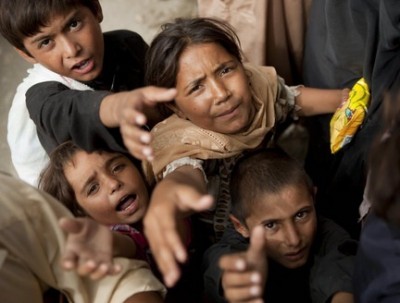
Donor fatigue kicks in after a week or two of any natural disaster. It is a very natural process as things move very quickly on the world stage. People forget about a godforsaken place as a disaster unfolds in some other corner of the world. The best antidote to this lassitude is a relentless media campaign. And that’s what is missing in the Pakistan floods.
While the coverage had been pervasive during the first two weeks, it has taken a backstage in recent days. Google News search for ‘Lady Gaga’ returned 20,200 results whereas ‘Pakistan Floods’ had a return of 12,300. True that news is still published but mostly in the back pages thus diminishing their chance of being read by people — and reducing any chances of further donations. One cannot blame the news writers and layout editors as other — and more important — news has taken center stage. Nevertheless, a little more highlighting will be good for the millions of victims.
More coverage is needed because the floods have not subsided yet. Manchar Lake, the largest fresh water lake in South Asia, is expected to burst its banks, thus causing more damage in the already ravaged Sindh province. This will uproot hundreds of thousands of people and thus create more problems for the flood managers of Pakistan.
There is also a perception that the devastation has not been extensive in Pakistan. People are not to blame for this. One unconsciously evaluates a disaster by looking at the death toll, which has remained rather low for Pakistan with around 1,800 deaths. Many are also not aware of the river floods that are devastating but slow moving. They are not like the tsunami that destroys everything in its path but recedes within a few hours. They affect far greater areas and work like slow poison, killing everything in their path but without making much of a noise. Lives were saved as evacuations were ordered but people lost their livestock and crops — their only livelihood in the dirt poor rural areas of Pakistan.
Compassion is thus still needed because the first phase of flooding is not over. As for the rehabilitation, Pakistan is stretching its muscles and the IMF has already extended a helping hand. The Pakistani government is intent on accepting this loan despite the fact that they can generate their own resources for the rehabilitation process. The country has a poor taxation system and the lack of land reforms has crippled the governance. Global donors should also scale back their grants or loans for the rehab process as that’s not a right thing to do.
It is, however, still the first stage. And it requires global attention to save lives.
While the coverage had been pervasive during the first two weeks, it has taken a backstage in recent days. Google News search for ‘Lady Gaga’ returned 20,200 results whereas ‘Pakistan Floods’ had a return of 12,300. True that news is still published but mostly in the back pages thus diminishing their chance of being read by people — and reducing any chances of further donations. One cannot blame the news writers and layout editors as other — and more important — news has taken center stage. Nevertheless, a little more highlighting will be good for the millions of victims.
More coverage is needed because the floods have not subsided yet. Manchar Lake, the largest fresh water lake in South Asia, is expected to burst its banks, thus causing more damage in the already ravaged Sindh province. This will uproot hundreds of thousands of people and thus create more problems for the flood managers of Pakistan.
There is also a perception that the devastation has not been extensive in Pakistan. People are not to blame for this. One unconsciously evaluates a disaster by looking at the death toll, which has remained rather low for Pakistan with around 1,800 deaths. Many are also not aware of the river floods that are devastating but slow moving. They are not like the tsunami that destroys everything in its path but recedes within a few hours. They affect far greater areas and work like slow poison, killing everything in their path but without making much of a noise. Lives were saved as evacuations were ordered but people lost their livestock and crops — their only livelihood in the dirt poor rural areas of Pakistan.
Compassion is thus still needed because the first phase of flooding is not over. As for the rehabilitation, Pakistan is stretching its muscles and the IMF has already extended a helping hand. The Pakistani government is intent on accepting this loan despite the fact that they can generate their own resources for the rehabilitation process. The country has a poor taxation system and the lack of land reforms has crippled the governance. Global donors should also scale back their grants or loans for the rehab process as that’s not a right thing to do.
It is, however, still the first stage. And it requires global attention to save lives.
| Daily Update |
